|
|
|
Sort Order |
|
|
|
Items / Page
|
|
|
|
|
|
|
| Srl | Item |
| 1 |
ID:
133568
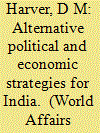

|
|
|
|
|
| Publication |
2014.
|
| Summary/Abstract |
D M Harver analyses the changing patterns of political ideology and economic thinking in India post-1985 and looks at the changing economic philosophy embraced by successive central and state governments. He also traces the main causes of the re-emergence of religiosity as a political factor.
|
|
|
|
|
|
|
|
|
|
|
|
|
|
|
|
| 2 |
ID:
126581
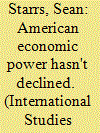

|
|
|
|
|
| Publication |
2013.
|
| Summary/Abstract |
This paper argues that a fundamental failing in the debate on the decline of American economic power is not taking globalization seriously. With the rise of transnational corporations (TNCs), transnational modular production networks, and the globalization of corporate ownership, we can no longer give the same relevance to national accounts such as balance of trade and GDP in the twenty-first century as we did in the mid-twentieth. Rather, we must summon data on the TNCs themselves to encompass their transnational operations. This will reveal, for example, that despite the declining global share of United States GDP from 40% in 1960 to below a quarter from 2008 onward, American corporations continue to dominate sector after sector. In fact, in certain advanced sectors such as aerospace and software-even in financial services-American dominance has increased since 2008. There are no serious contenders, including China. By looking at the wrong data, many have failed to see that American economic power has not declined-it has globalized.
|
|
|
|
|
|
|
|
|
|
|
|
|
|
|
|
| 3 |
ID:
192891
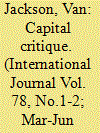

|
|
|
|
|
| Summary/Abstract |
Advocates of progressive political economy agree that the neo-liberal economic order has worsened environmental degradation, worker precarity, and oligarchy, but what are the alternatives? This article relates left-progressive discourses about concrete approaches and policy ideas to implications for the global economic order. While progressives explicitly seek a more social democratic global order, the various policy initiatives in the progressive imaginary implicitly involve approaches to order-building that are in scarcely acknowledged competition with one another. While neo-Keynesianism, justice for the Global South, a Global Green New Deal, and degrowth are all anti–neo-liberal approaches that pursue the same broad aims—reducing inequality within the Global North, raising standards of living and buffering structural violence in the Global South, and responding to the climate crisis—these goals potentially exhibit the tensions of a trilemma.
|
|
|
|
|
|
|
|
|
|
|
|
|
|
|
|
| 4 |
ID:
109792
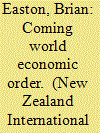

|
|
|
| 5 |
ID:
138361
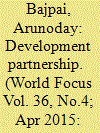

|
|
|
|
|
| Summary/Abstract |
India needs to address various challenges to make her development partnership more effective. If India's development partnership has to work as 'soft power' instrument of India's economic diplomacy, it has to be motivated by the spirit of sharing, equal partnership, mutual benefit, and India's entitled national interest.
|
|
|
|
|
|
|
|
|
|
|
|
|
|
|
|
| 6 |
ID:
120063
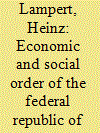

|
|
|
|
|
| Publication |
Germany, KAS, 1993.
|
| Description |
188p.pbk
|
|
|
|
|
|
|
|
|
|
|
|
Copies: C:1/I:0,R:0,Q:0
Circulation
| Accession# | Call# | Current Location | Status | Policy | Location |
| 057221 | 338.943/LAM 057221 | Main | On Shelf | General | |
|
|
|
|
| 7 |
ID:
126580
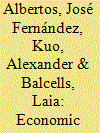

|
|
|
|
|
| Publication |
2013.
|
| Summary/Abstract |
Who do citizens blame for the recent European economic crisis? In this paper, we test theories about blame attribution with respect to the economic crisis. We argue that blame for the crisis is partially conditioned by partisan bias and framings of the crisis as being related to globalization. We test the argument with new survey data and a survey experiment from Spain. In the experiment, respondents receive different framings of the economic crisis which are endorsed by different political parties and non-partisan organizations. We obtain the following findings: (i) blame for who is responsible for the economic crisis is greatly affected by partisanship; (ii) making globalization as a cause of the crisis salient exonerates the government of blame, but only for co-partisans of the government; and (iii) citizens are willing to blame other globalization-related factors for the crisis, in particular, European governments and blame the domestic government less. The results expand our understanding of public opinion dynamics during major economic recessions and also suggest conditions under which "scapegoating" globalization can occur.
|
|
|
|
|
|
|
|
|
|
|
|
|
|
|
|
| 8 |
ID:
124380
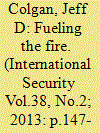

|
|
|
|
|
| Publication |
2013.
|
| Summary/Abstract |
What role does oil play in international security? While the threat of "resource wars" over possession of oil reserves is often exaggerated, the sum total of the political effects generated by the oil industry makes it a leading cause of war. Between one-quarter and one-half of interstate wars since 1973 have been connected to one or more oil-related causal mechanisms. Eight distinct mechanisms exist: resource wars, in which states try to acquire oil reserves by force; petro-aggression, whereby oil facilitates domestic political control of aggressive leaders such as Saddam Hussein or Ayatollah Ruhollah Khomeini; externalization of civil wars in petrostates; financing for insurgencies, such as Iranian oil money to Hezbollah; conflicts over potential oil-market domination, such as the United States' conflict with Iraq over Kuwait in 1991; control over transit routes, such as shipping lanes and pipelines; oil-related grievances, whereby the presence of foreign workers in petrostates helps extremist groups such as al-Qaida recruit locals; and as an obstacle to multilateral cooperation, such as when an importer curries favor with a petrostate to prevent multilateral cooperation on security issues. Understanding these mechanisms can help policymakers design grand strategy and allocate military resources
|
|
|
|
|
|
|
|
|
|
|
|
|
|
|
|
| 9 |
ID:
081745
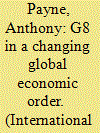

|
|
|
| 10 |
ID:
133846
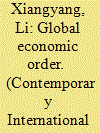

|
|
|
|
|
| Publication |
2014.
|
| Summary/Abstract |
After the end of the cold war, the global economy has been characterized by globalization. This is reflected in the growing transnational flow of goods, services and factors of production. It is also reflected in the global economic order and rules constraining transnational flows. Doubtless, the transnational flow of goods, services and factors of production can benefit participating countries.
|
|
|
|
|
|
|
|
|
|
|
|
|
|
|
|
| 11 |
ID:
132152


|
|
|
|
|
| Publication |
2014.
|
| Summary/Abstract |
At their summit in California last June, U.S. President Barack Obama and Chinese President Xi Jinping committed themselves to building trust between their countries. Since then, new official forums for communication have been launched (such as the military-to-military dialogues recently announced by the two countries' defense ministers), complementing existing forums such as the Strategic and Economic Dialogue (which features the countries' top diplomats and economic officials). But despite these efforts, trust in both capitals -- and in the countries at large -- remains scarce, and the possibility of an accidental or even intentional conflict between the United States and China seems to be growing. Given the vast potential costs such a conflict would carry for both sides, figuring out how to keep it at bay is among the most important international challenges of the coming years and decades. The factors undermining trust are easy to state. East Asia's security and economic landscape is undergoing massive, tectonic change, driven primarily by China's remarkable economic rise in recent decades. That economic miracle, in turn, has made it possible for China to increase its military capacity and ramp up its political role in the region and beyond. China's leaders and prominent strategists have been at pains to insist that China's rise will be peaceful and poses no threat to its neighbors or the existing international political and economic order. But many members of the world community remain concerned and even skeptical, noting that history and international relations theory are replete with examples of conflict arising from clashes between a dominant and a rising power."
|
|
|
|
|
|
|
|
|
|
|
|
|
|
|
|
| 12 |
ID:
133847
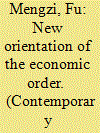

|
|
|
|
|
| Publication |
2014.
|
| Summary/Abstract |
In general, any regional order or international order depends on the strategies of major powers. The order arises because power have chosen it while it is passively accepted by other parties. International orders are relatively stable. The current international order under the UN framework as the principal axis was formed after the Second World War. Our principles of peace and development have been set within it, and the behavior and legal norms of sovereign nations within international relations are meant to comply with it.
|
|
|
|
|
|
|
|
|
|
|
|
|
|
|
|
| 13 |
ID:
132124
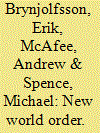

|
|
|
|
|
| Publication |
2014.
|
| Summary/Abstract |
Recent advances in technology have created an increasingly unified global marketplace for labor and capital. The ability of both to flow to their highest-value uses, regardless of their location, is equalizing their prices across the globe. In recent years, this broad factor-price equalization has benefited nations with abundant low-cost labor and those with access to cheap capital. Some have argued that the current era of rapid technological progress serves labor, and some have argued that it serves capital. What both camps have slighted is the fact that technology is not only integrating existing sources of labor and capital but also creating new ones.
|
|
|
|
|
|
|
|
|
|
|
|
|
|
|
|
| 14 |
ID:
126541
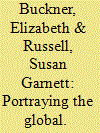

|
|
|
|
|
| Publication |
2013.
|
| Summary/Abstract |
Many have noted the rise of the global in academic and popular discourse. We ask how this global frame of reference has been incorporated into secondary social science textbooks, a realm traditionally dominated by nationalist discourse. Utilizing a data set from more than 500 secondary school textbooks from around the world, spanning 1970-2008, we describe the incorporation of mentions of globalization and global citizenship into textbooks over time and then use a multilevel model to determine the textbook and country-level variables associated with mentions of each. We find that globalization and global citizenship are both predicted by the textbook content's reflection of the external world, including international events and mentions of human rights. However, no cross-national economic or political differences systematically predict incorporation of these topics. We argue that mentions of globalization and global citizenship in textbooks are two manifestations of a world culture that increasingly emphasizes interconnectedness in postnational society
|
|
|
|
|
|
|
|
|
|
|
|
|
|
|
|
| 15 |
ID:
184980
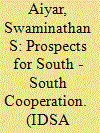

|
|
|
| 16 |
ID:
130906
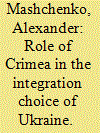

|
|
|
|
|
| Publication |
2014.
|
| Summary/Abstract |
I SHARE the greater part of apprehensions voiced here in connection with a possible signing of the Association Agreement between Ukraine and the EU. This will be a heavy blow to Ukrainian and Crimean economies. I want to draw your attention to the fact that without Crimea the situation in Ukraine could have been worse or even much worse. It is Crimea and its people who kept Ukraine within the Russian World and prevented the final rupture. In a way, the transfer of the peninsula to Ukraine was in the interests of Russia. Having sacrificed Taurida, it retained Ukraine in the field of its political and cultural attraction. I do hope that sociologists, political scientists, political technologists, and politicians will agree that the majority of the Crimean population would have voted for a membership in the Customs Union at a referendum on Ukraine's civilizational (integration) choice had it been organized. Let us hypothesize how would the deputies of the Supreme Rada of Ukraine who represent Crimea in this highest legislative structure vote at a referendum or in the Rada.
|
|
|
|
|
|
|
|
|
|
|
|
|
|
|
|
| 17 |
ID:
124136
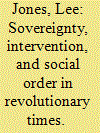

|
|
|
|
|
| Publication |
2013.
|
| Summary/Abstract |
This article explores how sovereignty and (non-)intervention are implicated in the (re)production of specific social orders. Sovereignty and the non-interference principle circumscribe 'domestic' politics from 'the international', defining who is legitimately included or excluded from the struggles that determine political and social orders. State managers seek to admit forces and resources favourable to the order they are seeking to create, whilst excluding those deleterious to it. In revolutionary periods, however, these attempts to 'cage' social relations often crumble as transnational forces engage in fierce, multifaceted conflicts overlapping territorial borders. In such circumstances, both norms of non-interference and practices of intervention may be used by dominant forces to help contain the spread of sociopolitical conflict and to strengthen their hand in the struggle to (re)define social order. Sovereignty regimes are thus shaped by the strategies and ideologies of the various social groups locked in conflict at a particular historical moment. This argument is illustrated through the case of Cold War Southeast Asia, where sovereignty and intervention were both used to stabilise capitalist social order and curtail transnational, radical threats from below.
|
|
|
|
|
|
|
|
|
|
|
|
|
|
|
|
| 18 |
ID:
004772
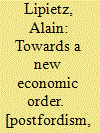

|
|
|
|
|
| Publication |
Cambridge, Univ. Pr., 1992.
|
| Description |
x,206p.
|
| Standard Number |
0745608663
|
|
|
|
|
|
|
|
|
|
|
|
Copies: C:1/I:0,R:0,Q:0
Circulation
| Accession# | Call# | Current Location | Status | Policy | Location |
| 035706 | 330/LIP 035706 | Main | On Shelf | General | |
|
|
|
|
|
|
|
|
|